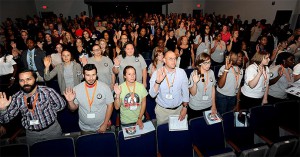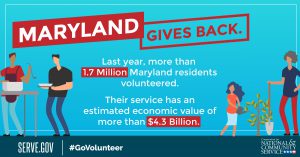Volunteering in Maryland During Coronavirus
The Spirit of Volunteerism and Community and National Service is alive and well during this time of need. The State of Maryland and its community partners are working to help Marylanders, and are proud to support Marylanders serving Marylanders. Those who are considering volunteering have options, both in-person as well as virtually through local volunteer connectors listed here.
Your support of front-line organizations caring for vulnerable populations is urgently needed now, while donations are also needed in the long-term to all social impact organizations to weather the long-term consequences of this crisis and our collective recovery. Please consider donating to critical needs at Maryland Unites.
Volunteer safely using your local volunteer connector: Please adhere to all safety protocols for each organization. Donations are the best way to serve Marylanders safely. Consider donating to the most critical volunteer and donation needs on Marylanders Serving Marylanders, here.
Register for volunteer opportunities with the Disaster Aid Response Team (DART), here. Donate and serve wisely to help disaster victims. Visit the Maryland Voluntary Organizations Active in Disaster (VOAD) for a list of private and nonprofit agencies active in disaster relief, here. The State of Maryland encourages everyone to contribute wisely to disaster recovery efforts. Consider the following before you donate goods, money, or your time:
For Volunteers: If you are a High Risk individual or if any of the items below 1-4 apply to someone in your immediate household or yourself, please refrain from volunteering. For Organizations: Organizations that are accepting volunteers should contact their local volunteer connector to learn best practices, such as appropriate restrictions to limit volunteers to best protect vulnerable populations. Find your local volunteer connector, listed here.
There are important ways to care for your community right from your own home and neighborhood. Check-in on your neighbors through call or text. As more and more people experience isolation, we encourage you to call and check in on your neighbors, especially those who may not have support networks or adequate resources. It’s easy to feel overwhelmed right now but building connections and empathy can go a long way in reducing stress. Calling and texting is a good example of responsible social distancing. “CAP” is a great way to remember your neighbors: C – Check on your neighbors (through call or text) A – Assess needs and assist when possible P – Protect self and neighbors by adhering to social distancing guidelines Connect with your children. In times of crisis, it’s common for youth to be curious and seek more attachment from parents, guardians, and caregivers. Answer their questions about COVID-19 with honest and age-appropriate information to ease their anxiety. *Adapted from Serve Illinois

Volunteering is a Maryland tradition, reaching as far back as 1633 when the Maryland Charter established its first militia. From that point in history, Maryland citizens have continued to dedicate their time and effort to protecting and preserving the environment, mentoring and tutoring young people, feeding the hungry and homeless, donating time and money to nonprofits, and countless other services to communities.
Today, Maryland citizens continue to dedicate themselves to creating a stronger Maryland. According to a 2018 report on volunteering in the United States released by the Corporation for National and Community Service,
- 1.7 million Marylanders volunteer each year;
- Marylanders provide 181.9 million hours of service;
- 96.0% of residents regularly talk or spend time with friends and family.



